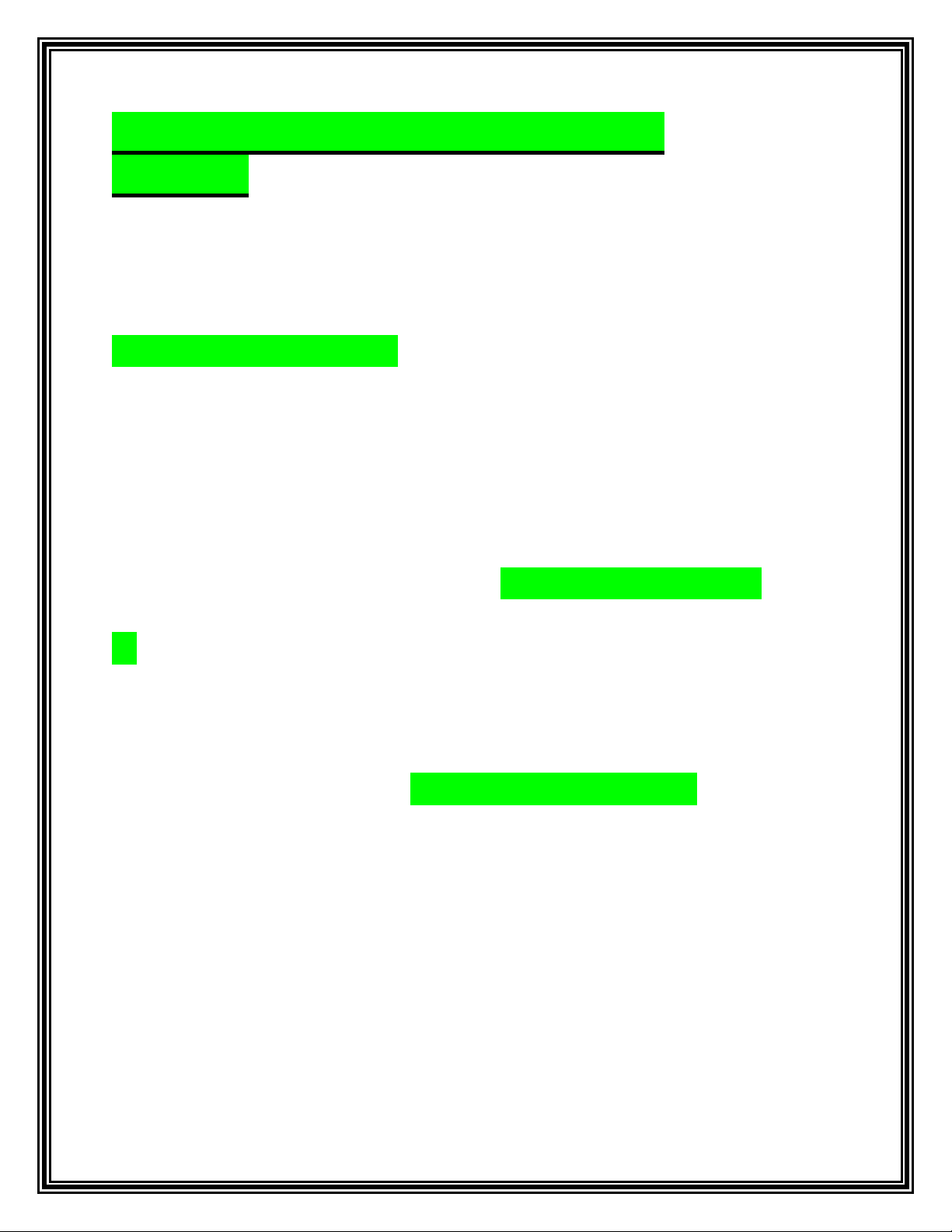
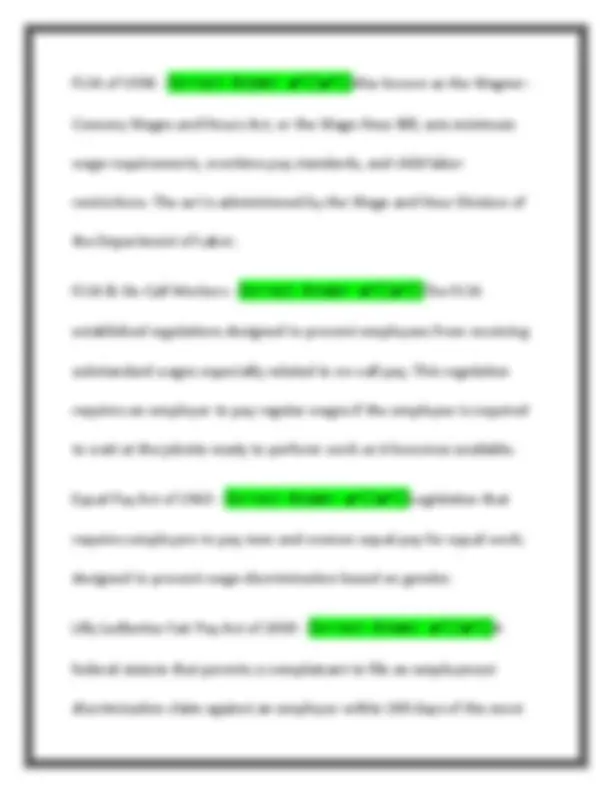
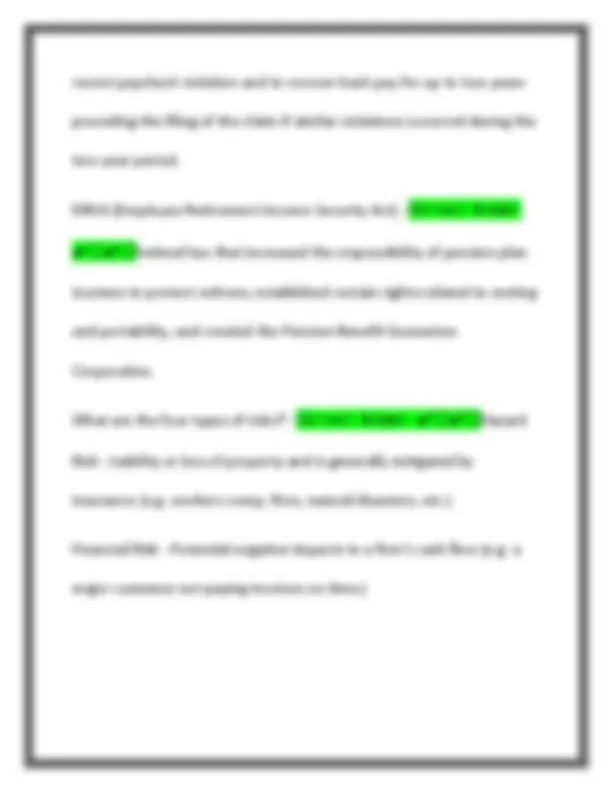
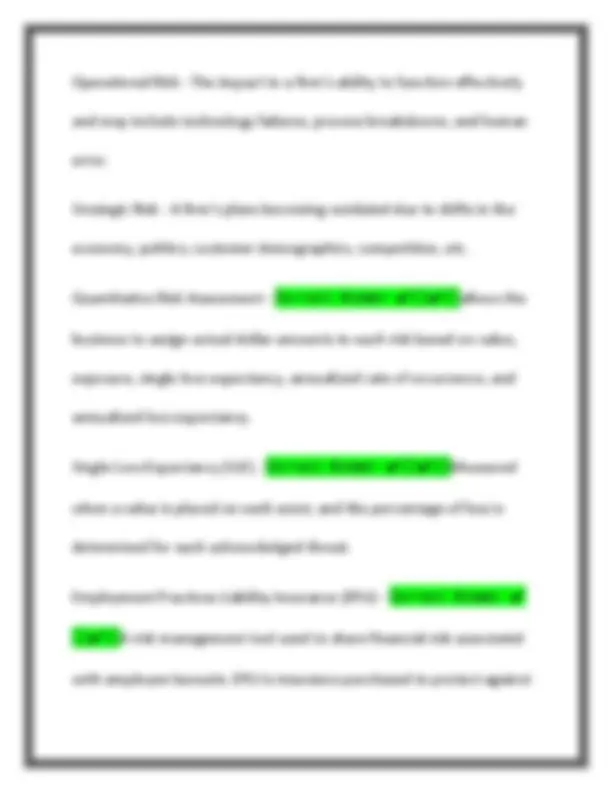
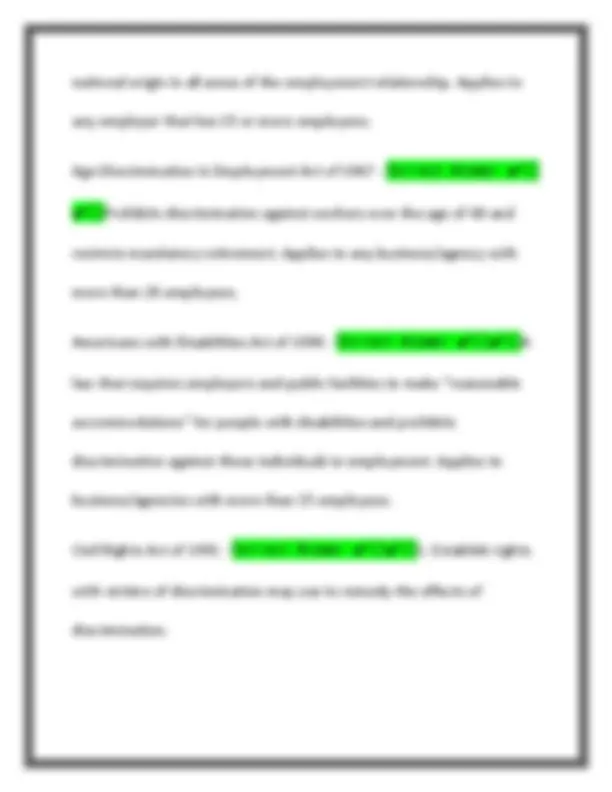
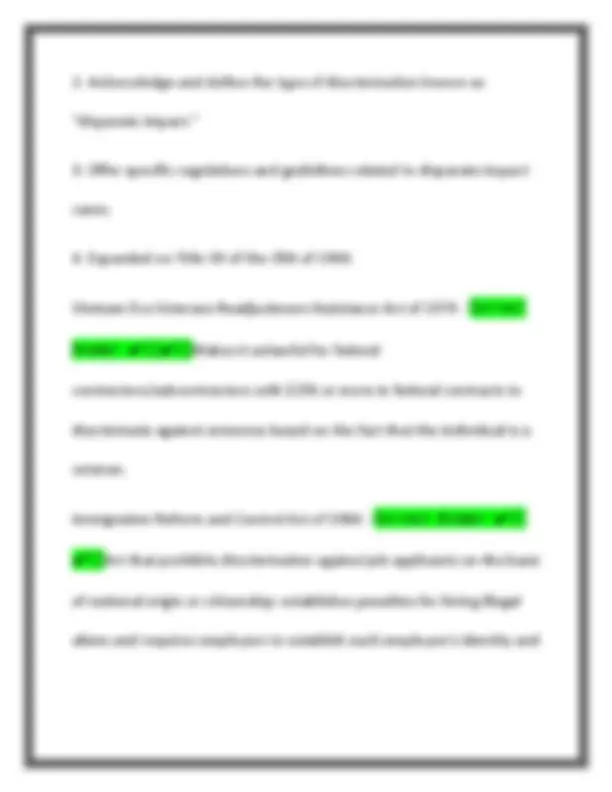
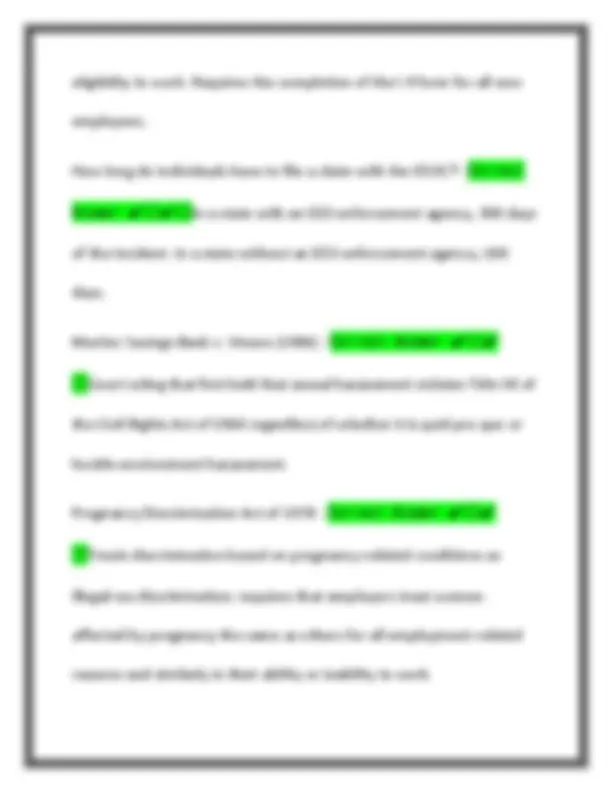
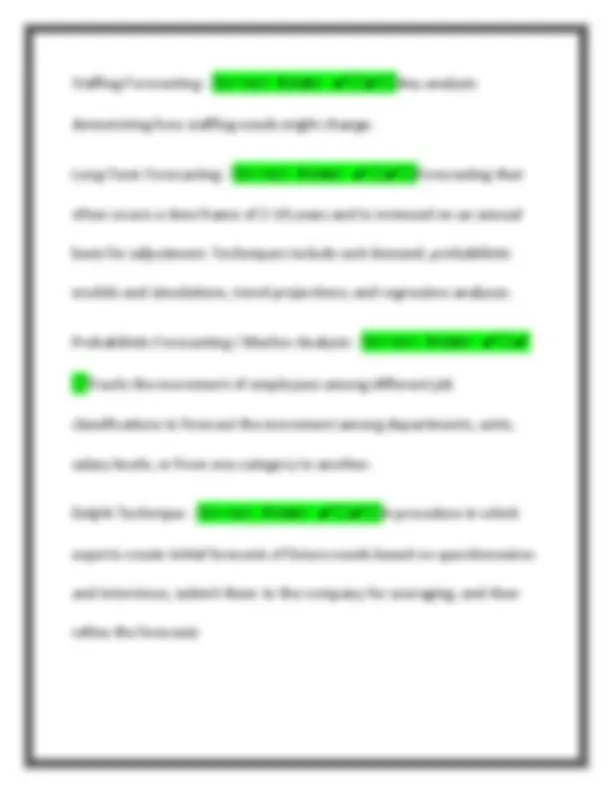
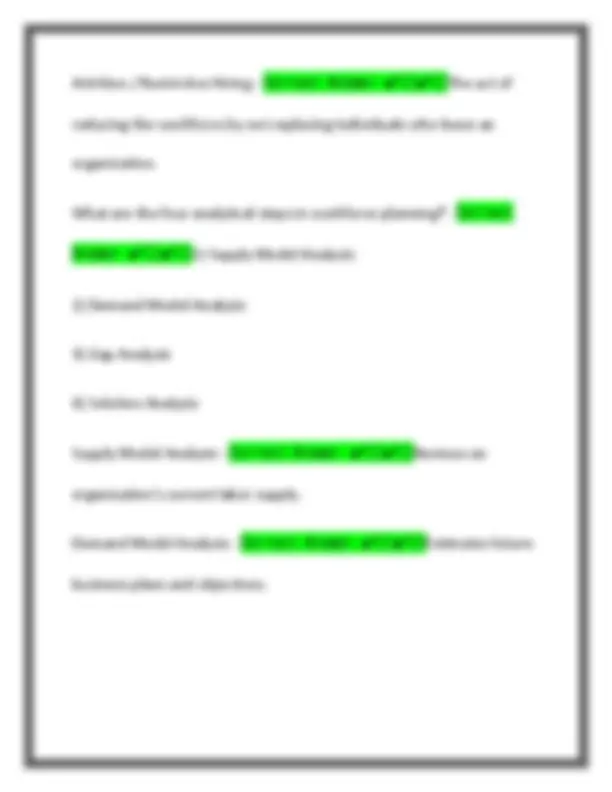
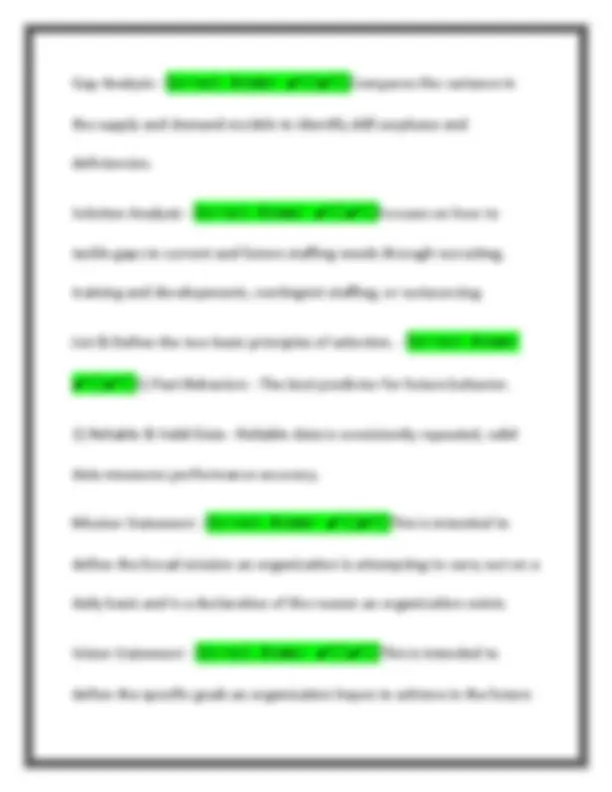
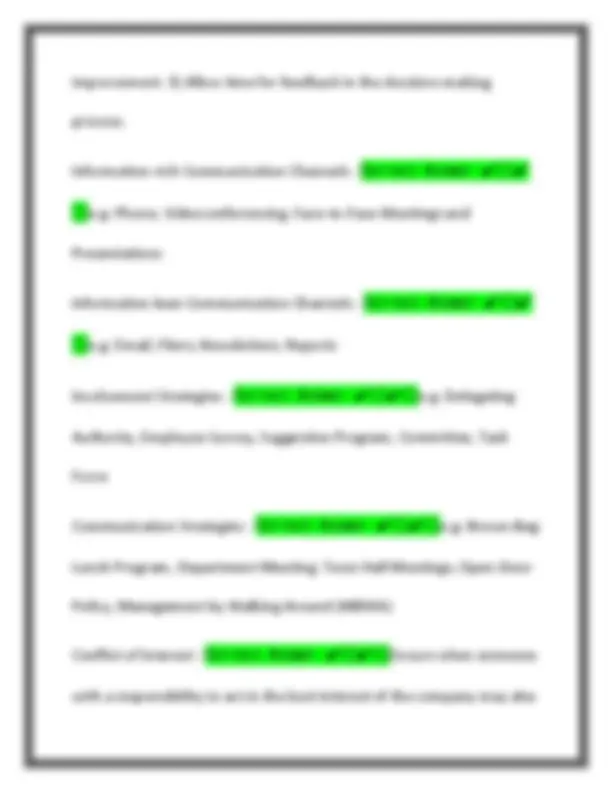
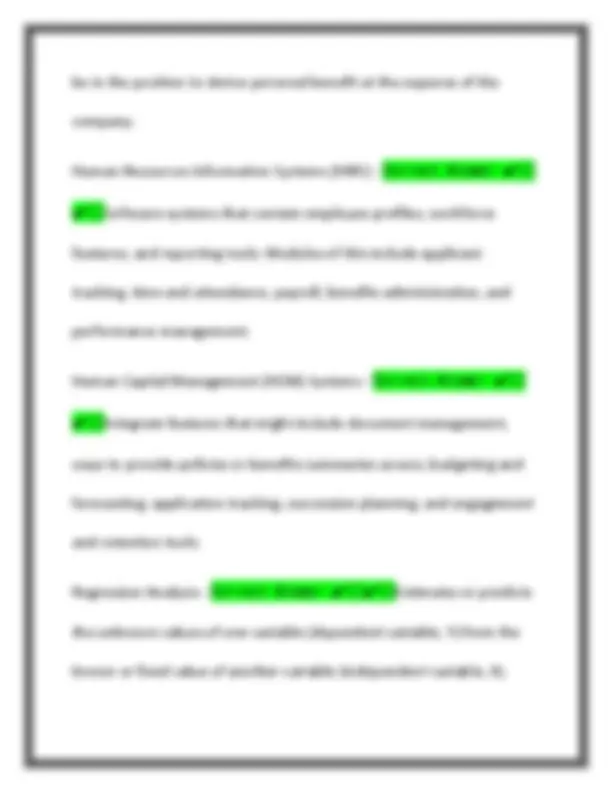
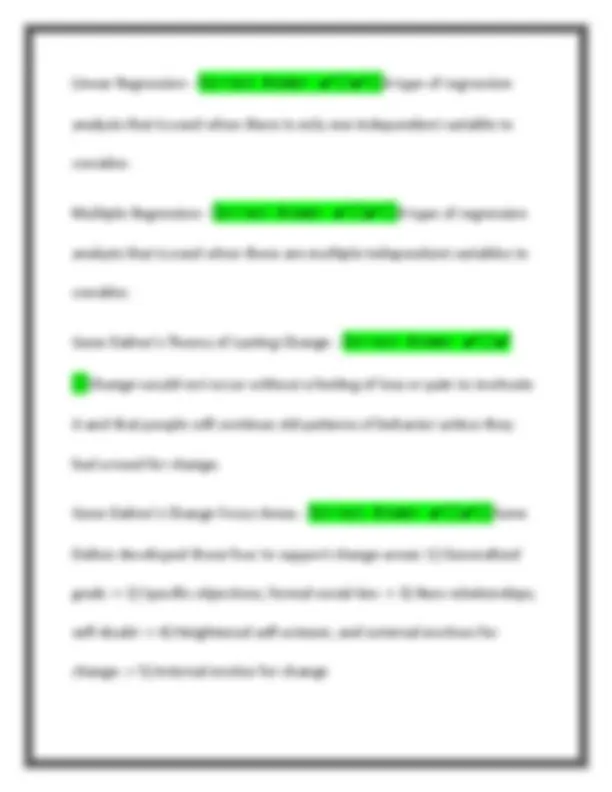
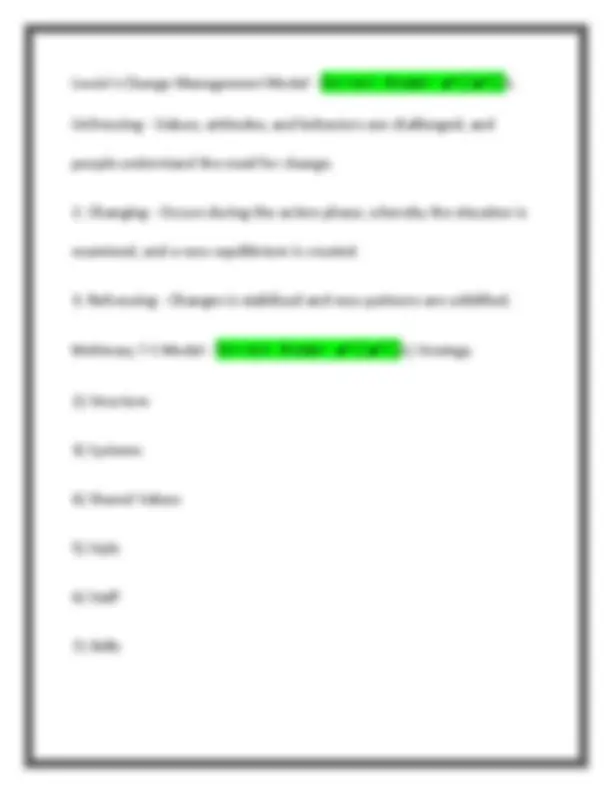
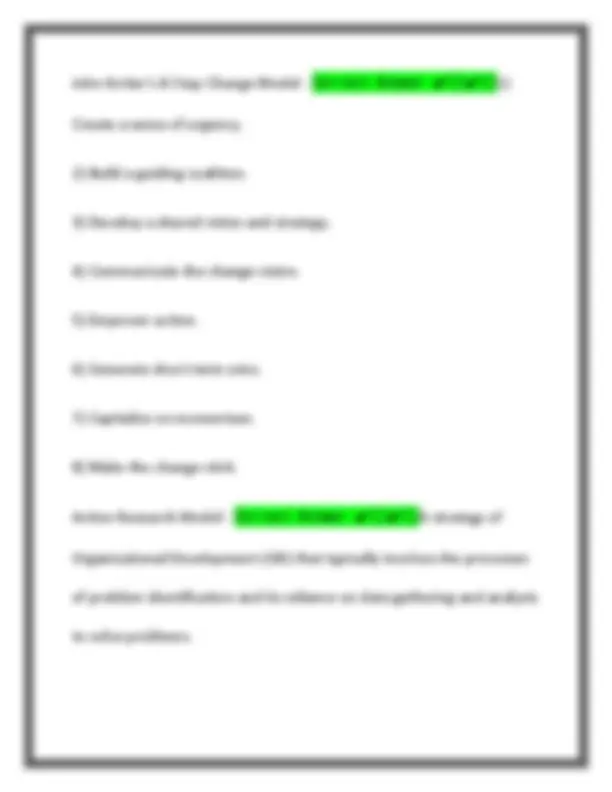
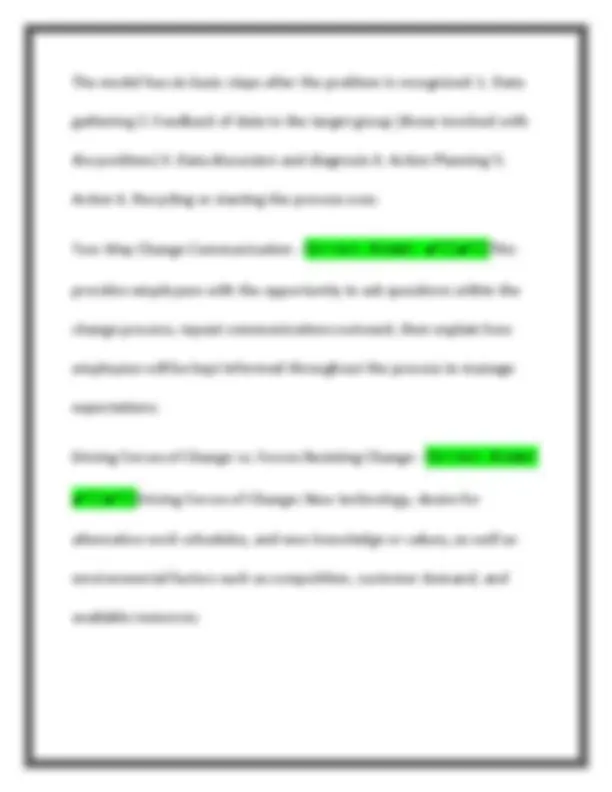
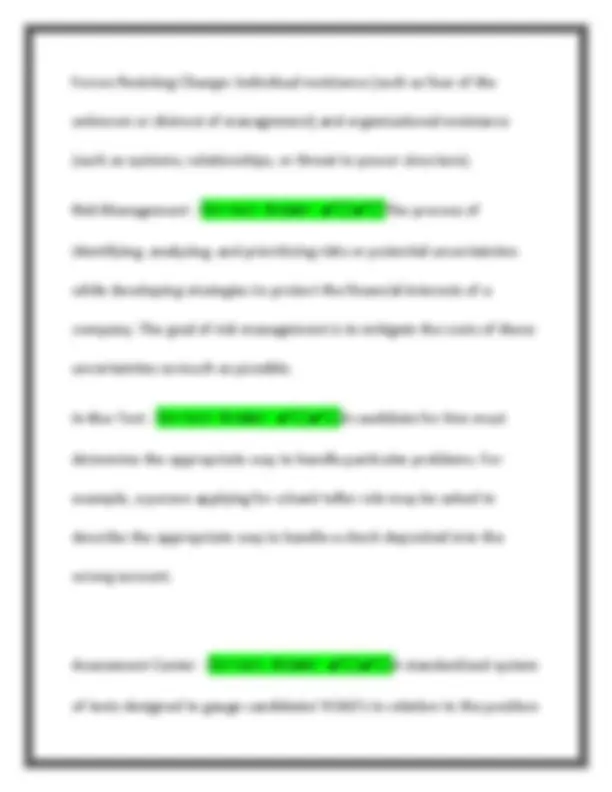
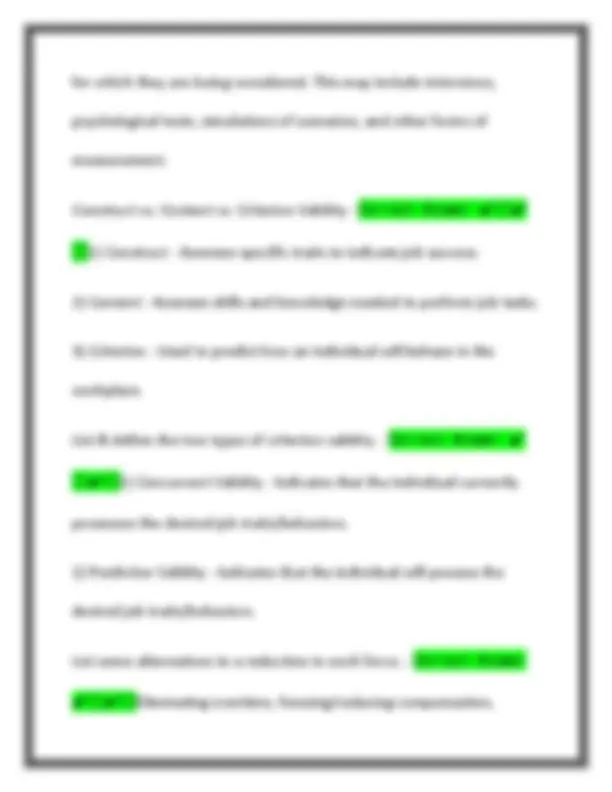
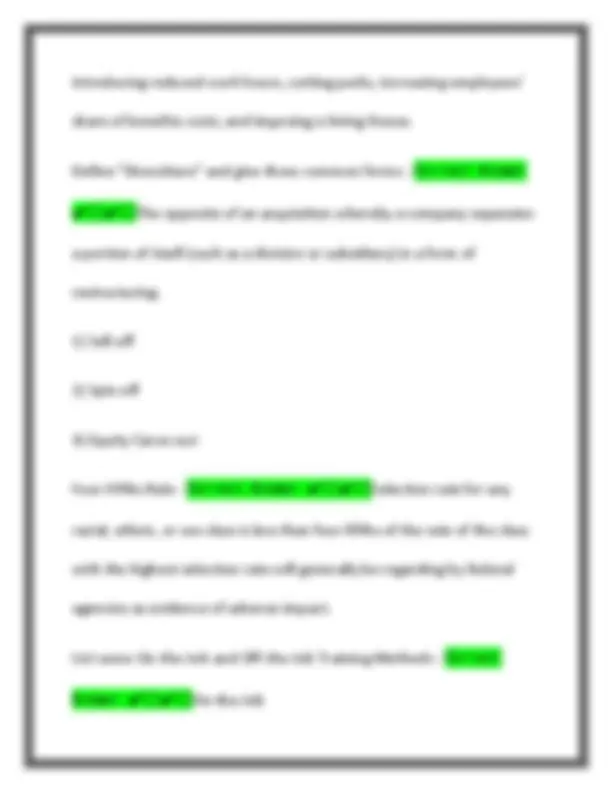
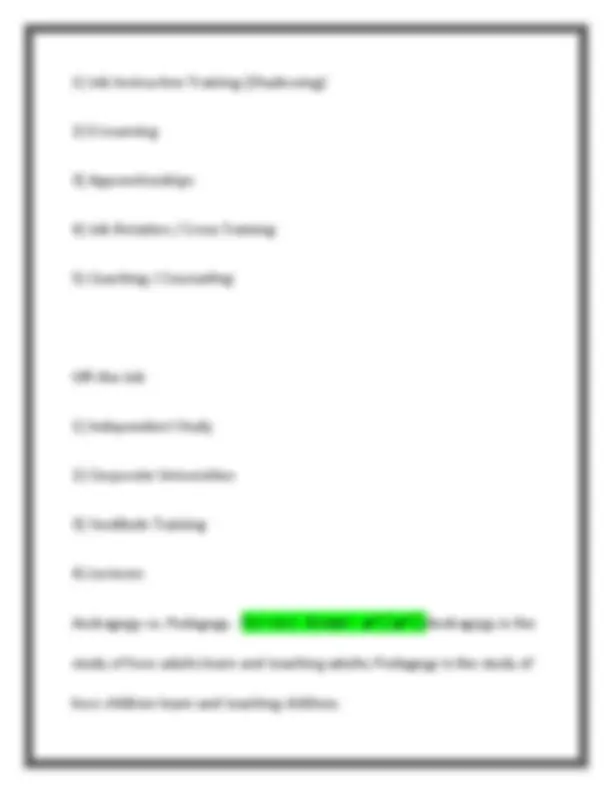
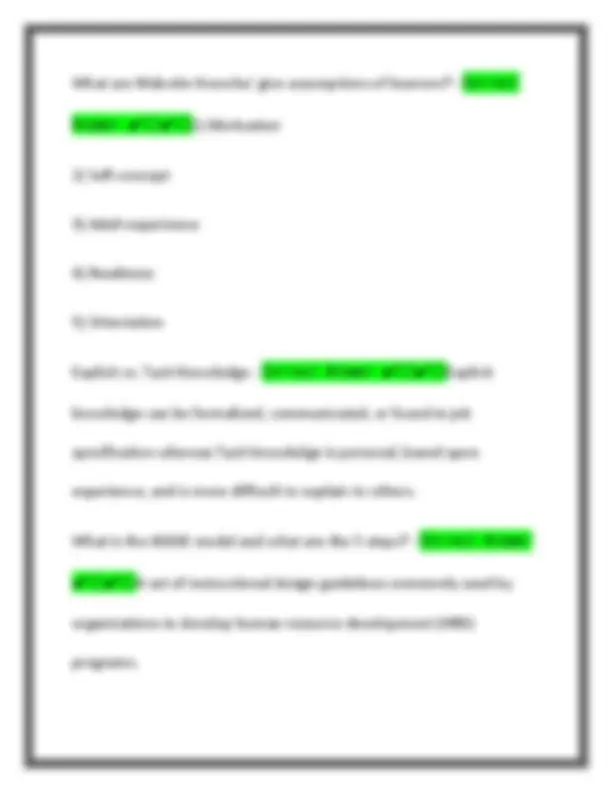
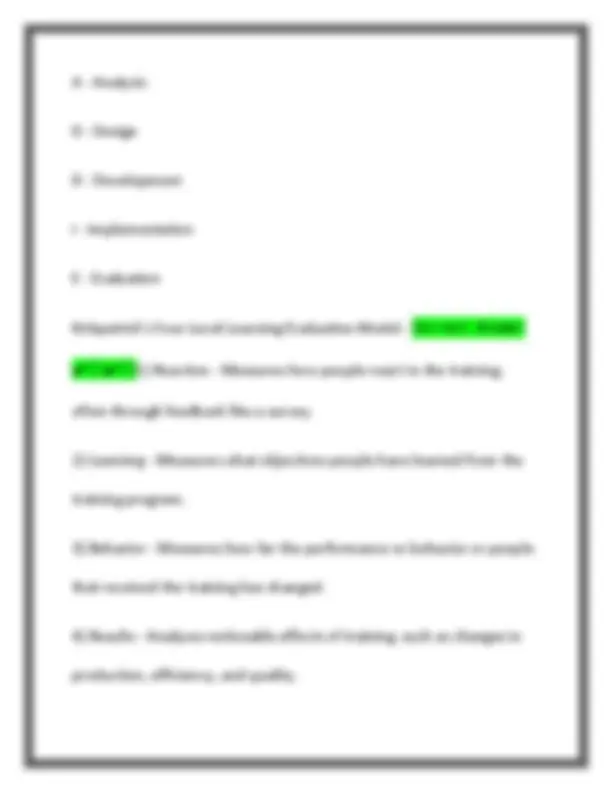
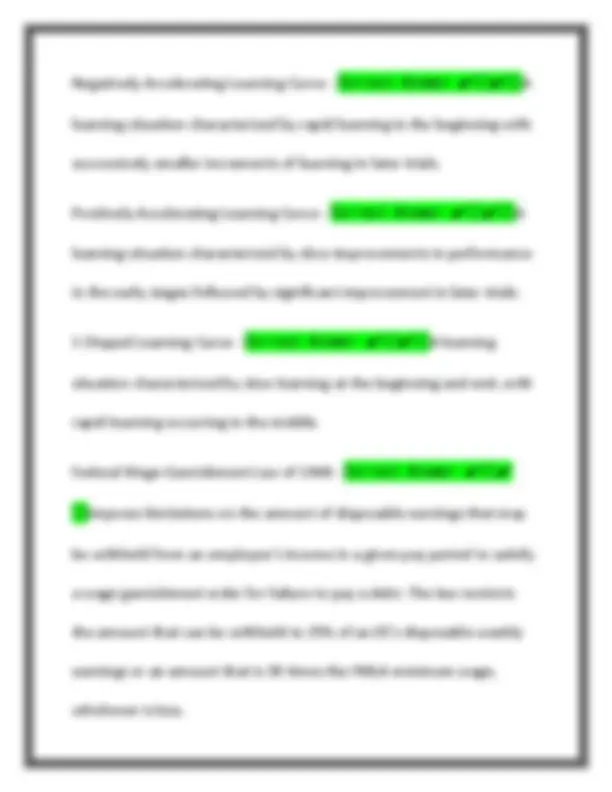
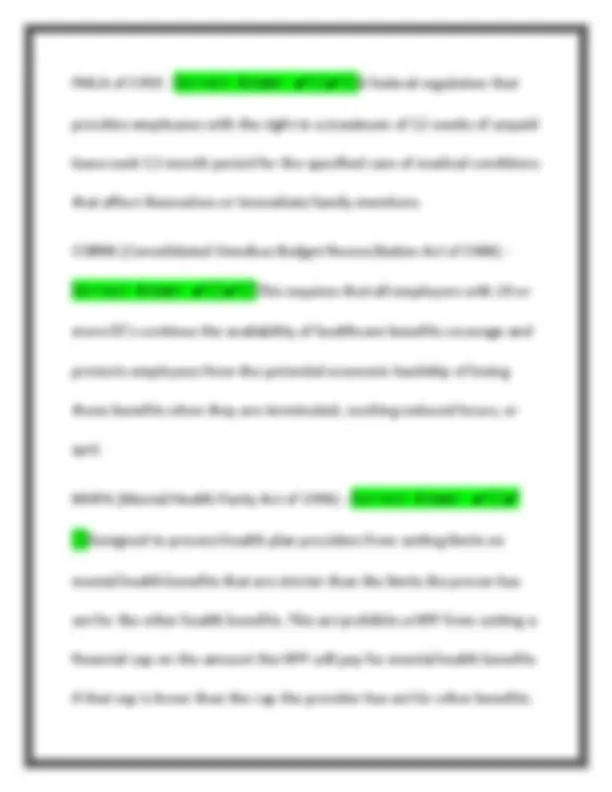
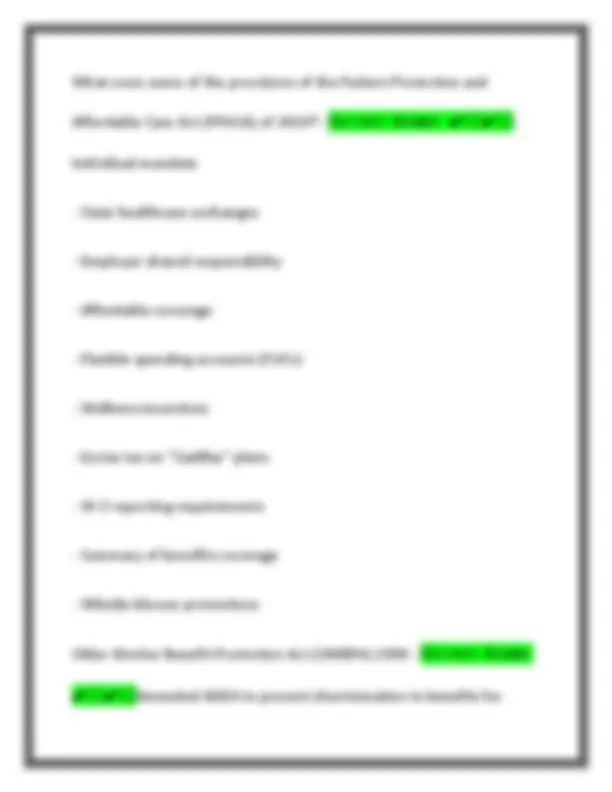
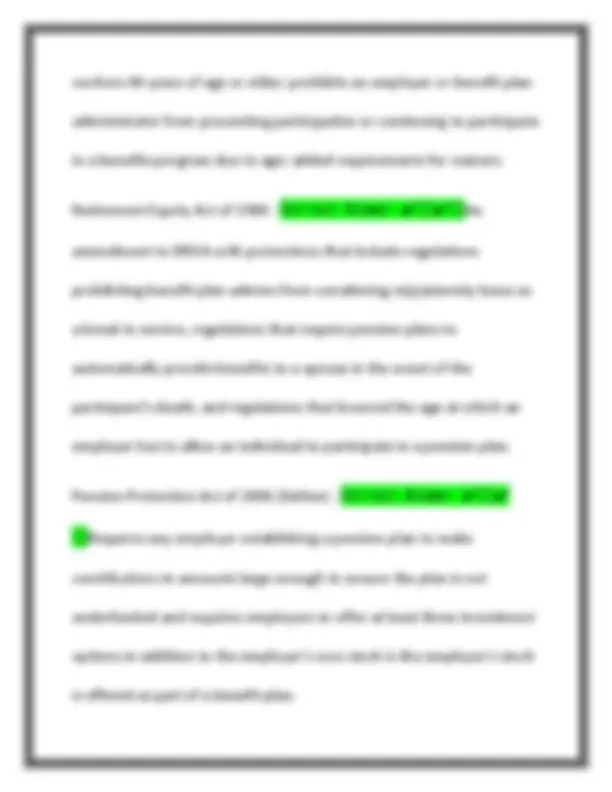
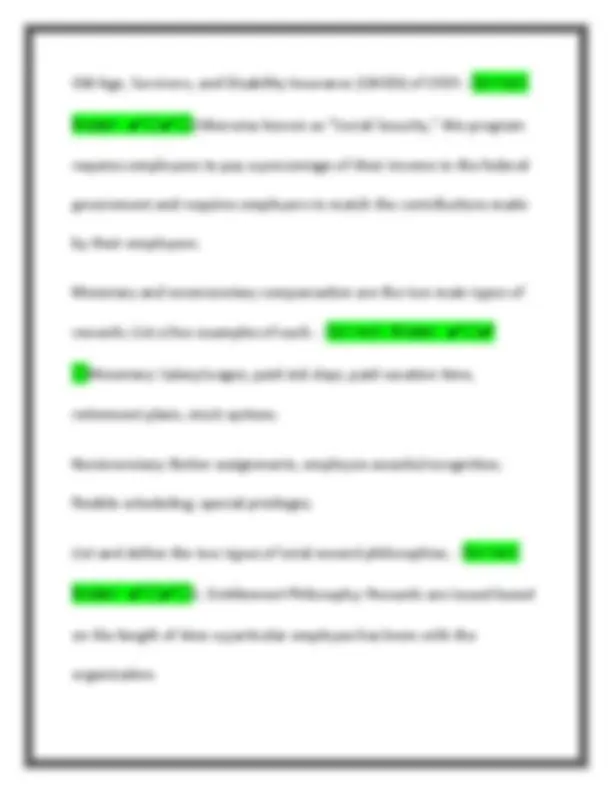
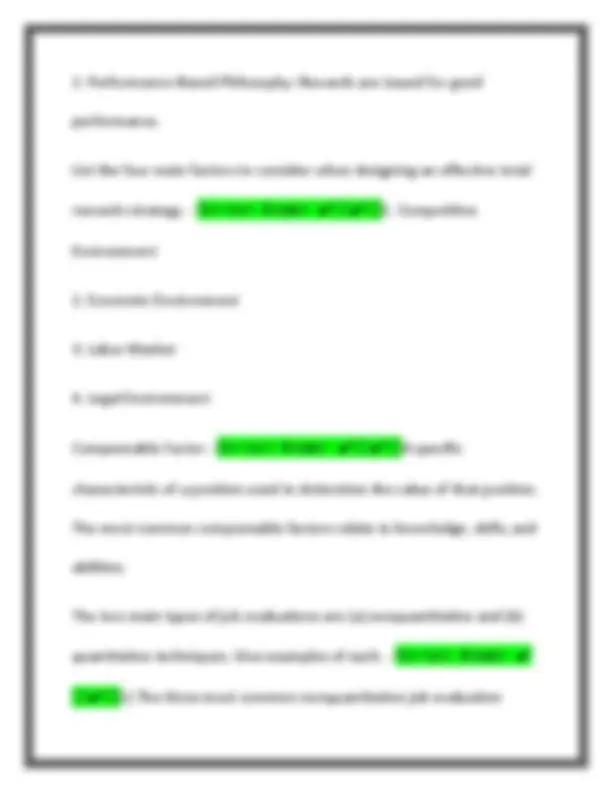
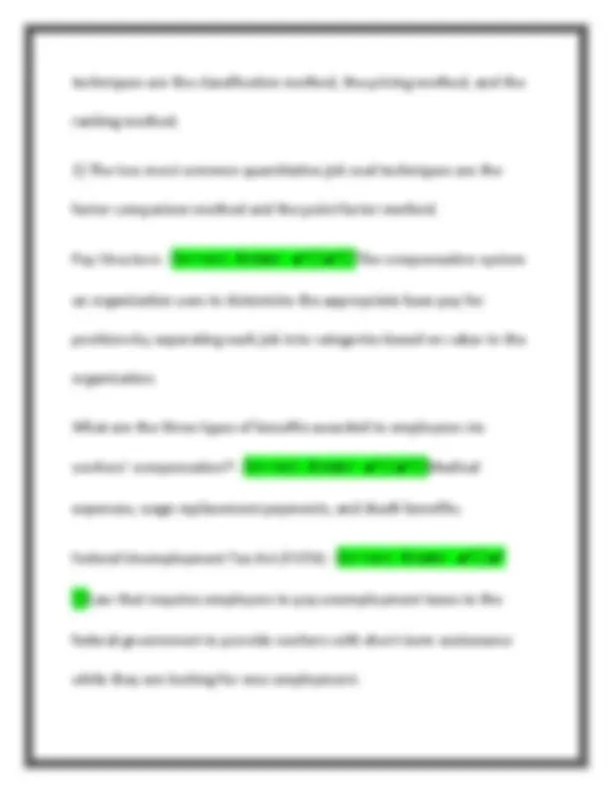
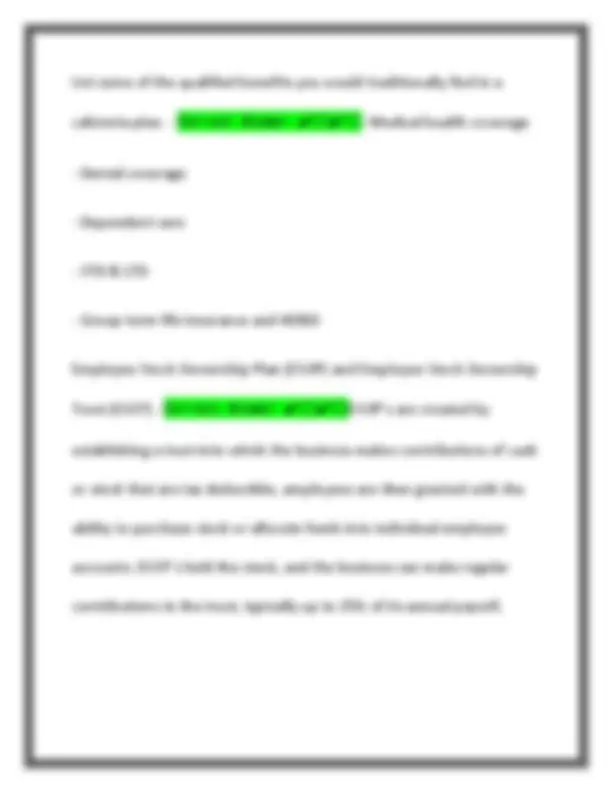
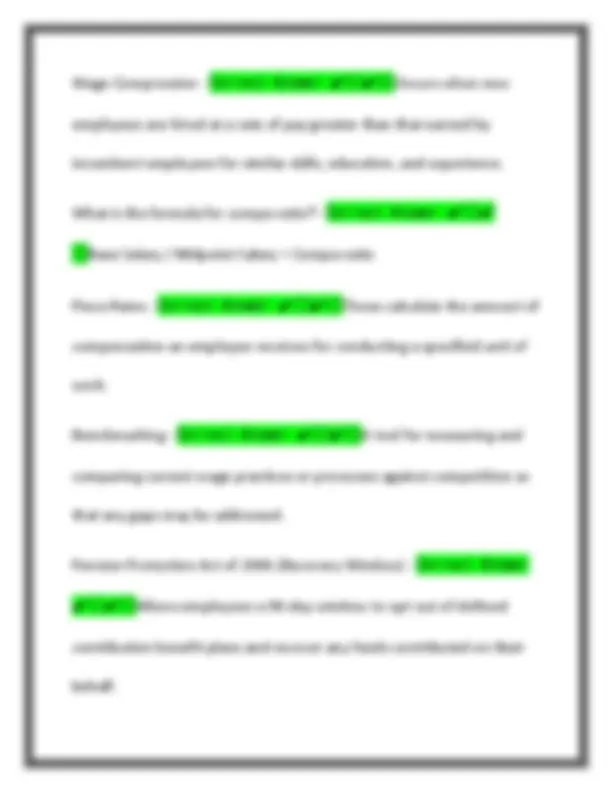
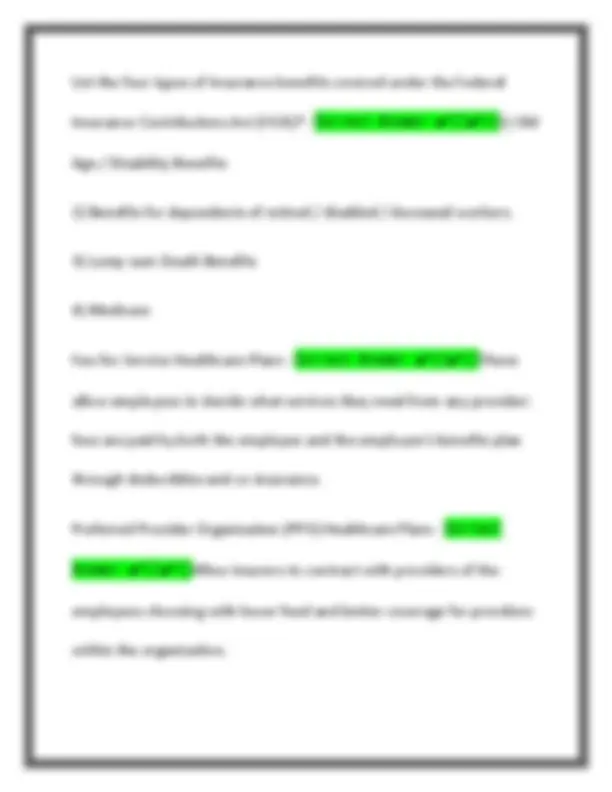
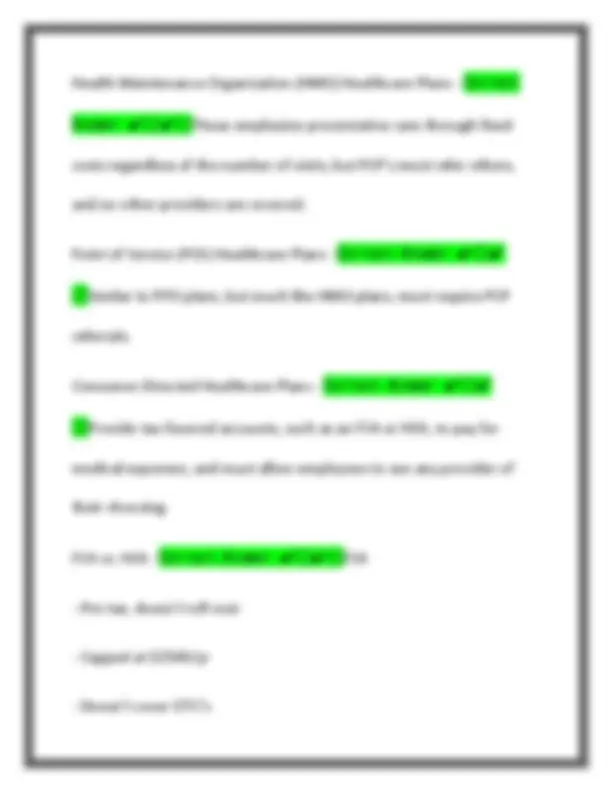
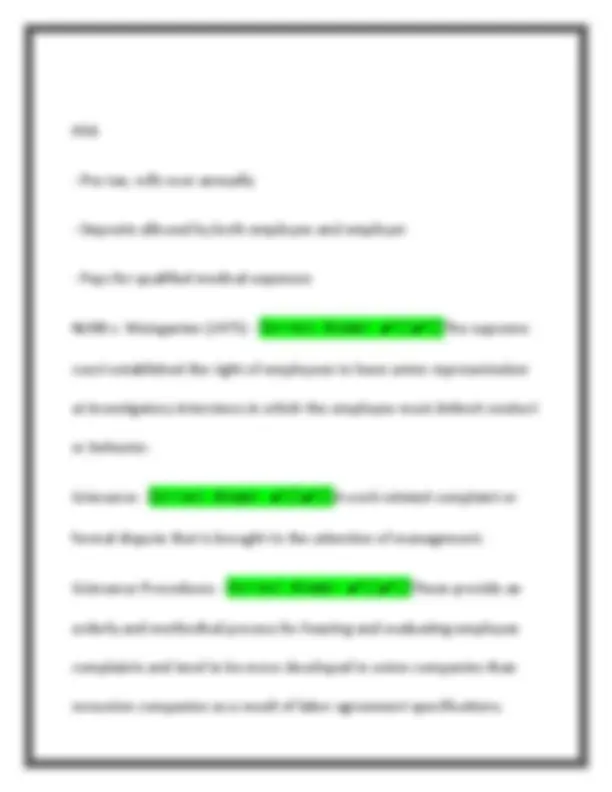
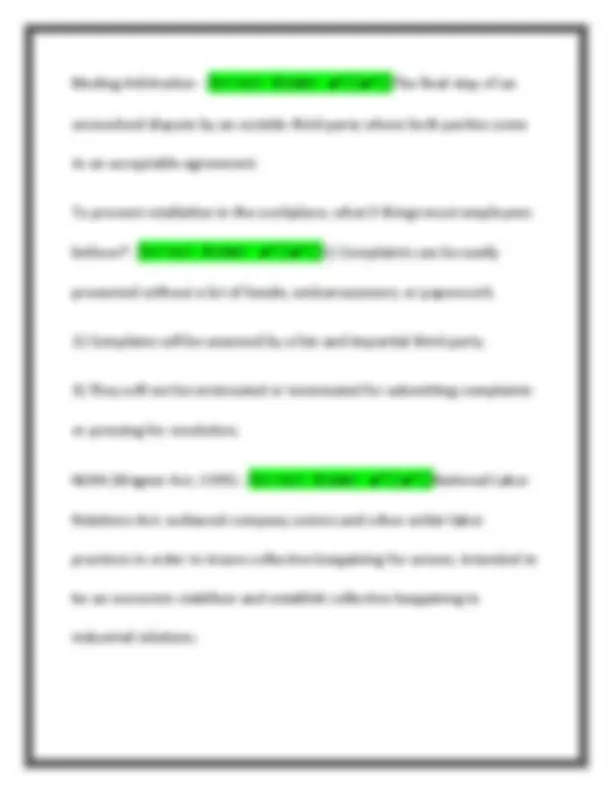
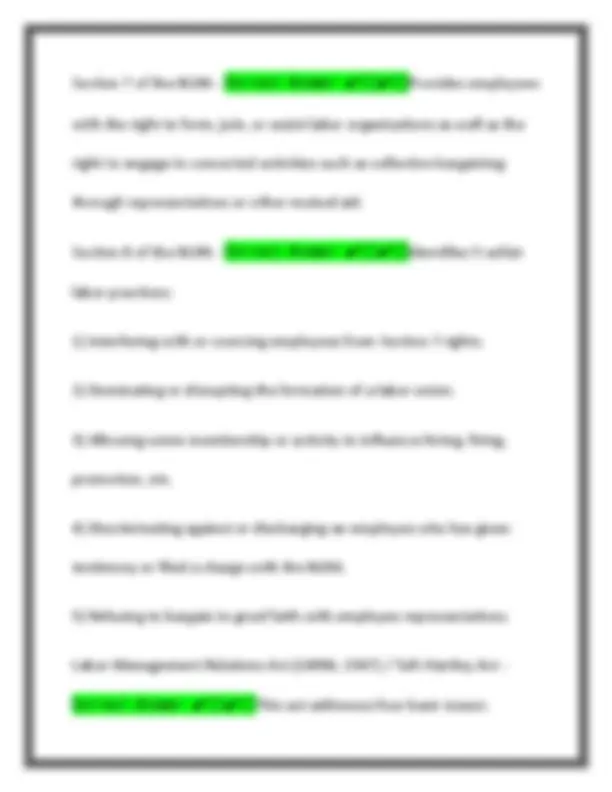
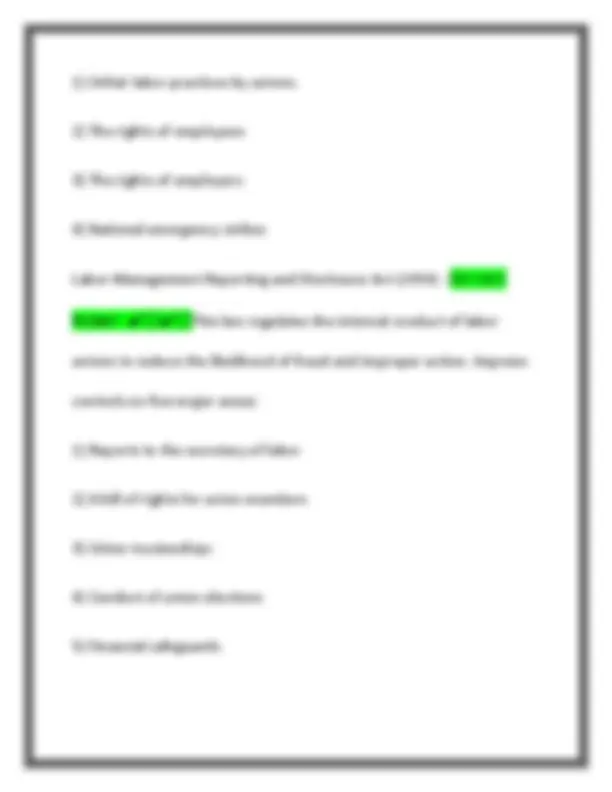
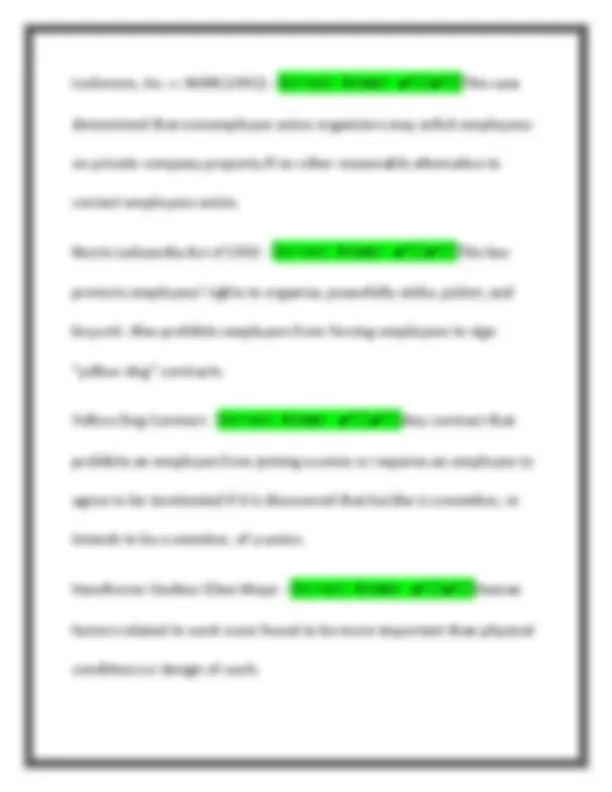
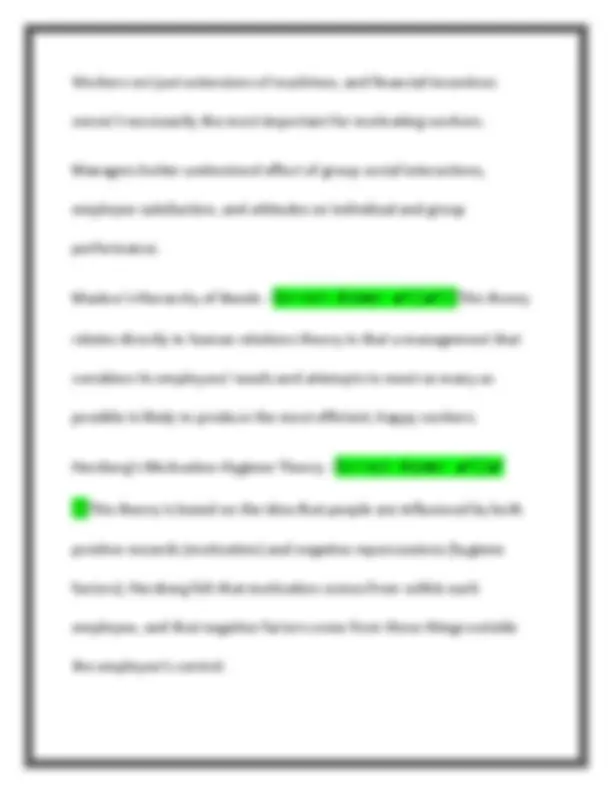
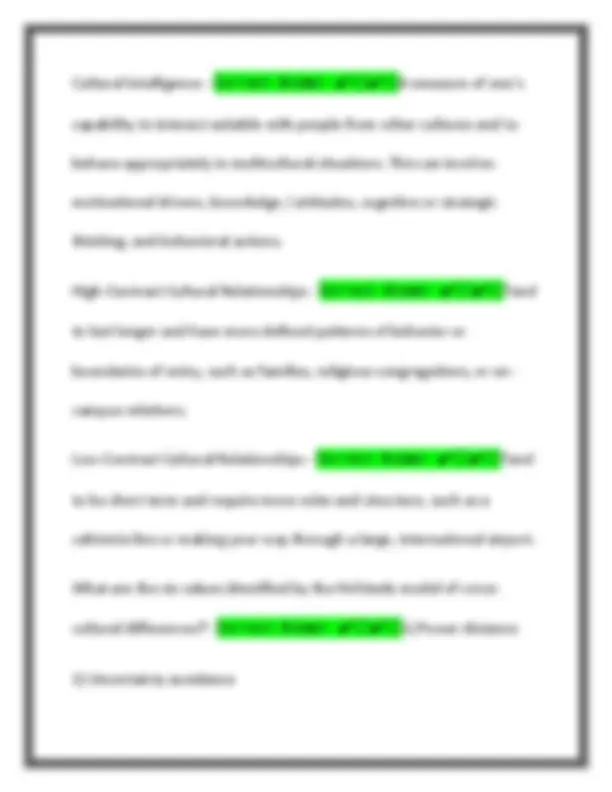
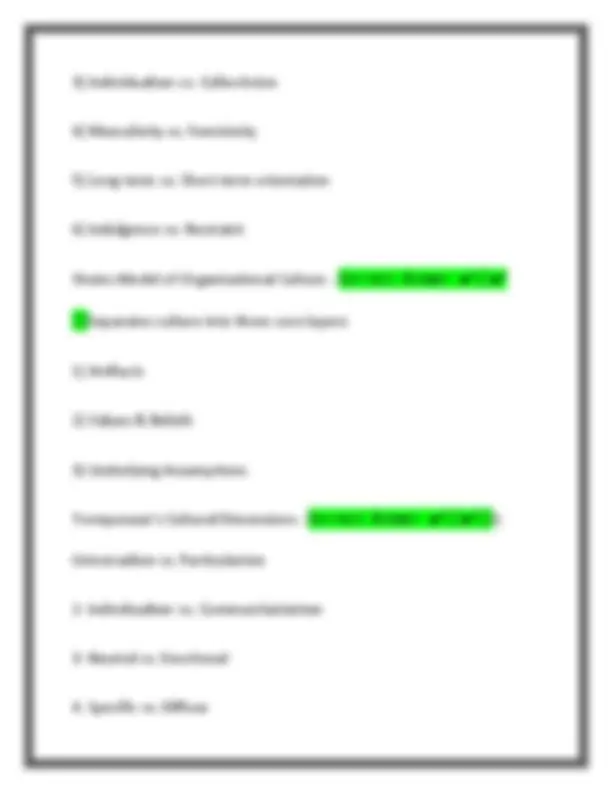
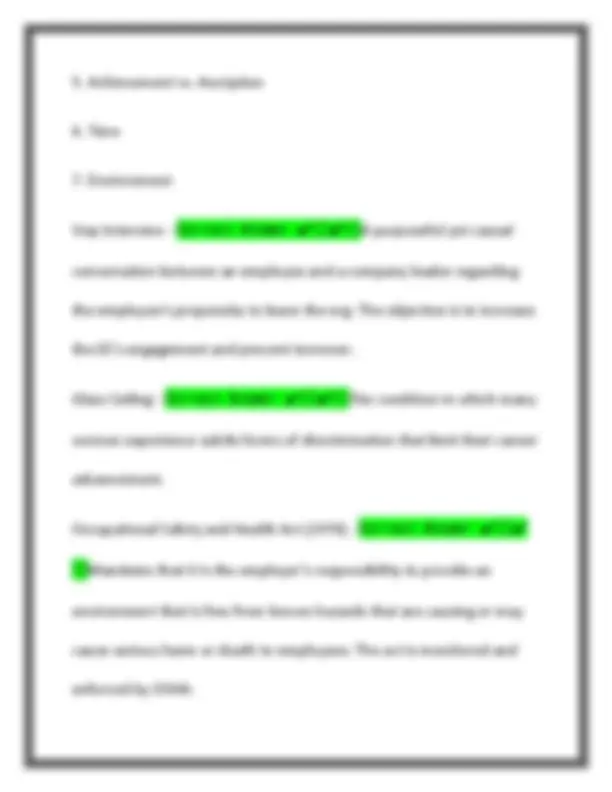
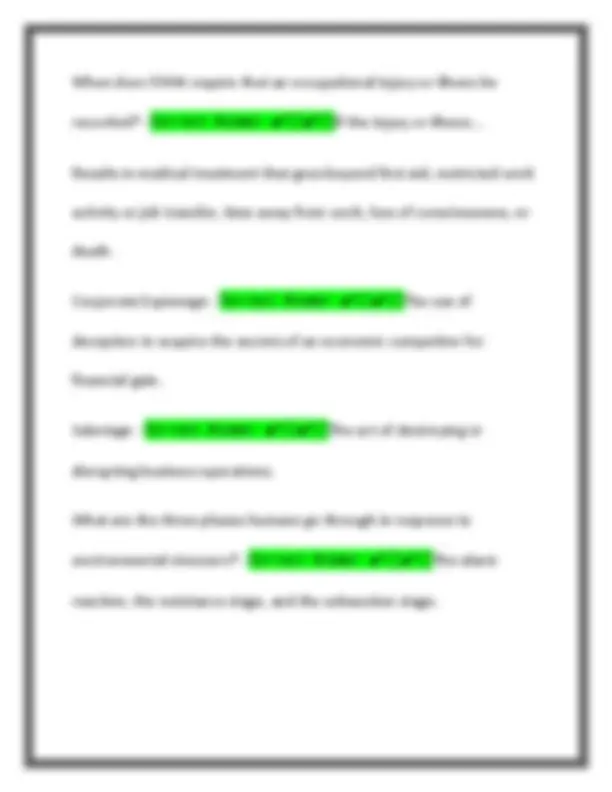
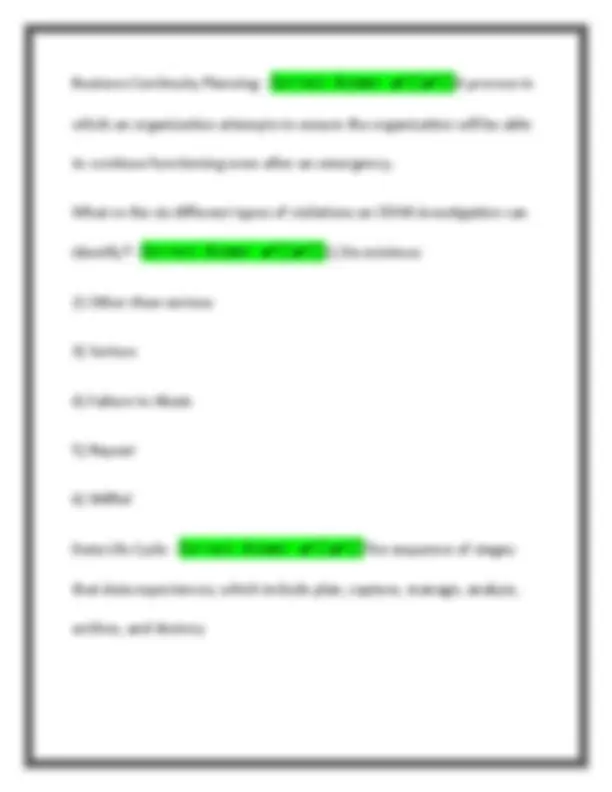
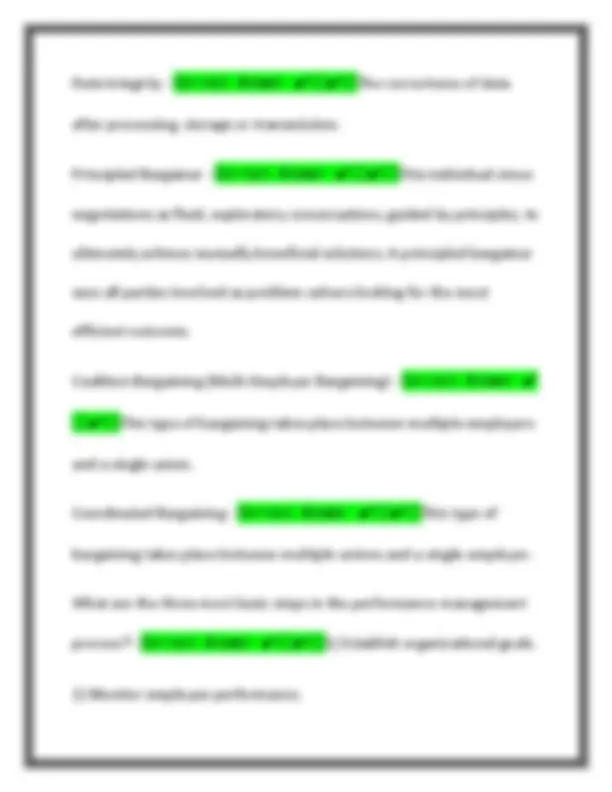
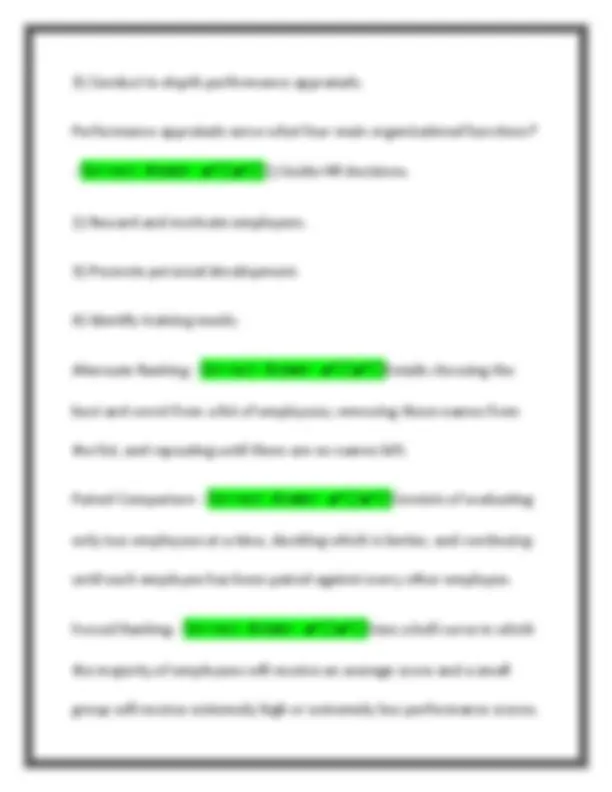
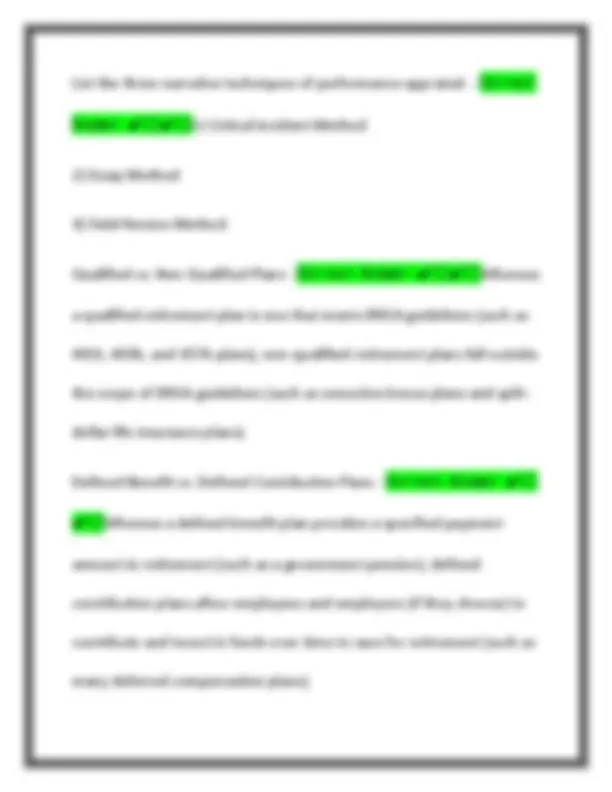
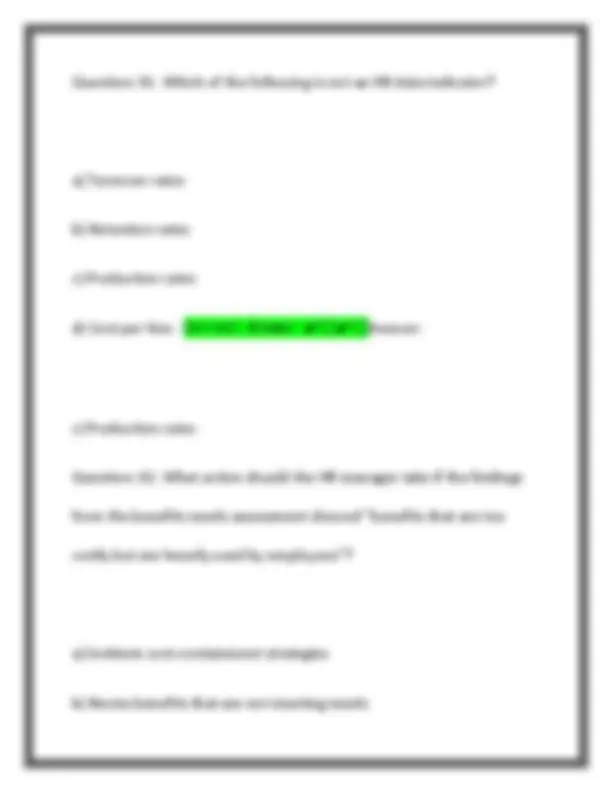
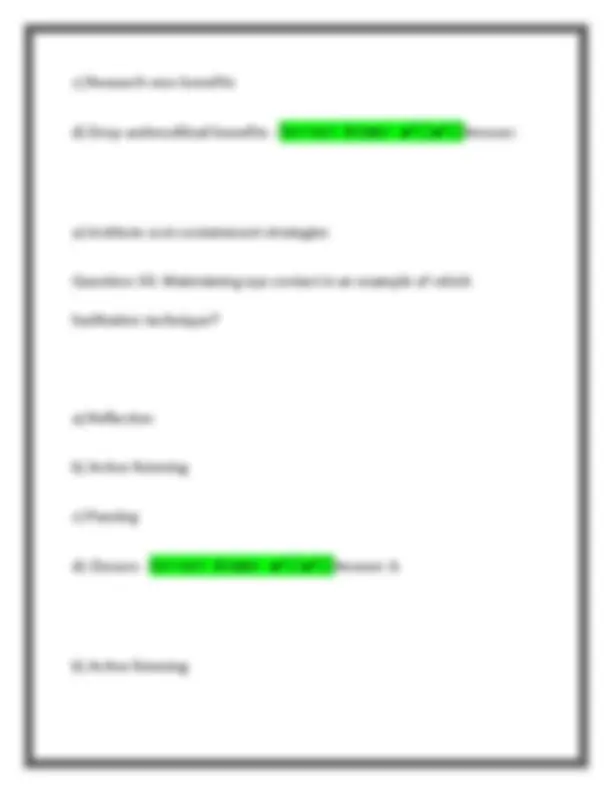
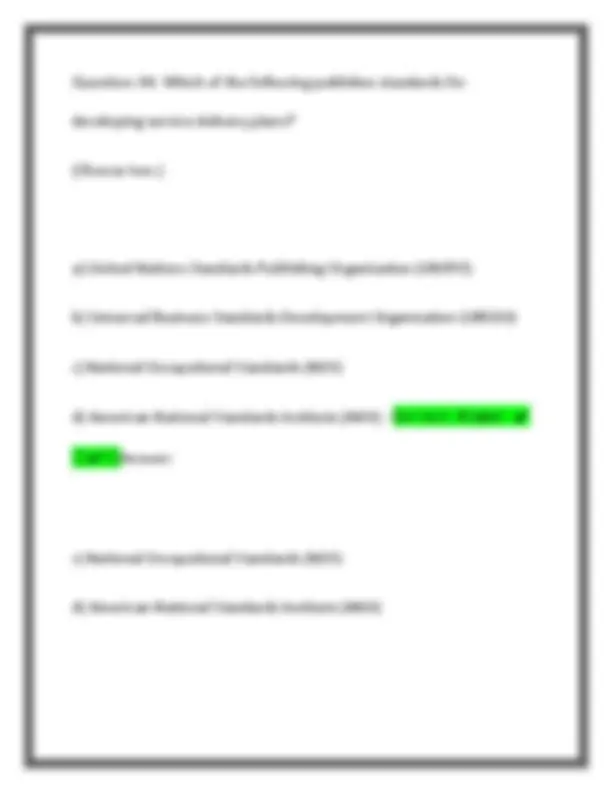
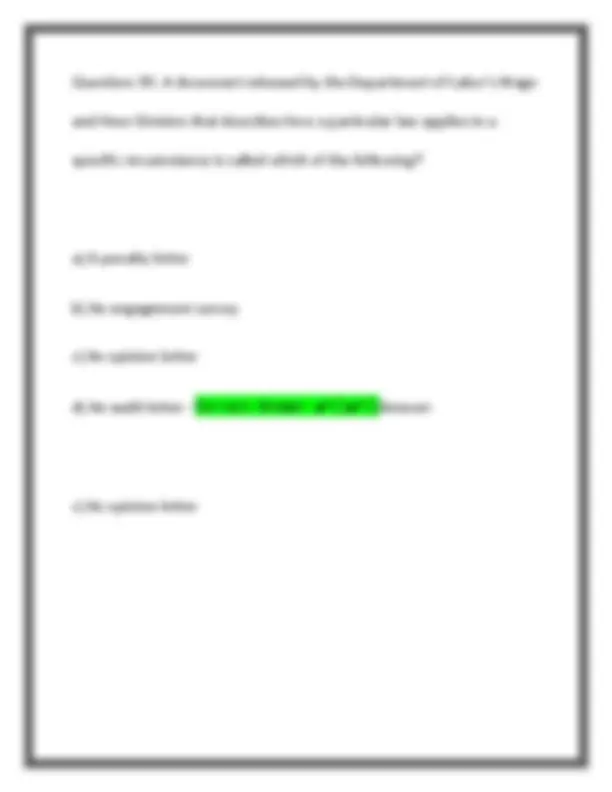


Study with the several resources on Docsity

Earn points by helping other students or get them with a premium plan


Prepare for your exams
Study with the several resources on Docsity

Earn points to download
Earn points by helping other students or get them with a premium plan
Community
Ask the community for help and clear up your study doubts
Discover the best universities in your country according to Docsity users
Free resources
Download our free guides on studying techniques, anxiety management strategies, and thesis advice from Docsity tutors
HRCI - PHR Exam Questions And Answers | Definitive Exam Study Guide
Typology: Exams
1 / 58

This page cannot be seen from the preview
Don't miss anything!



















































What are the three main phases of OD according to Kurt Lewin? - Correct Answer ✔️ ✔️ 1) Unfreezing
Change
Refreezing
McClelland's Acquired Needs Theory - Correct Answer ✔️ ✔️
McClelland saw motivation as primarily intrinsic and said that it arose
from three main needs: achievement, affiliation, and power.
Locke's Goal-Setting Theory - Correct Answer ✔️ ✔️ Locke
concluded that employees are driven by explicit, measurable goals that are challenging but attainable.
Self-Determination Theory - Correct Answer ✔️ ✔️ This theory
identifies three core intrinsic motivators: autonomy, competence, and relatedness.
Retention Rate vs. Turnover Rate - Correct Answer ✔️ ✔️
Retention = No. of EE's for a measurable period / No. of EE's at start
of measurement period * 100
Turnover = No. of EE's who left during a measurable period / Average no. of EE's during the measurement period * 100
What are the four phases of the employee lifecycle? - Correct Answer
✔️ ✔️ 1) Recruitment
Integration
Development
Departure
recent paycheck violation and to recover back pay for up to two years preceding the filing of the claim if similar violations occurred during the two-year period.
ERISA (Employee Retirement Income Security Act) - Correct Answer
✔️ ✔️ Federal law that increased the responsibility of pension plan trustees to protect retirees, established certain rights related to vesting and portability, and created the Pension Benefit Guarantee Corporation.
What are the four types of risks? - Correct Answer ✔️ ✔️ Hazard
Risk - Liability or loss of property and is generally mitigated by insurance (e.g. workers comp, fires, natural disasters, etc.)
Financial Risk - Potential negative impacts to a firm's cash flow (e.g. a major customer not paying invoices on time.)
Operational Risk - The impact to a firm's ability to function effectively and may include technology failures, process breakdowns, and human error.
Strategic Risk - A firm's plans becoming outdated due to shifts in the economy, politics, customer demographics, competition, etc.
Quantitative Risk Assessment - Correct Answer ✔️ ✔️ allows the
business to assign actual dollar amounts to each risk based on value, exposure, single loss expectancy, annualized rate of occurrence, and annualized loss expectancy.
Single Loss Expectancy (SLE) - Correct Answer ✔️ ✔️ Measured
when a value is placed on each asset, and the percentage of loss is determined for each acknowledged threat.
Employment Practices Liability Insurance (EPLI) - Correct Answer ✔️
✔️ A risk management tool used to share financial risk associated
with employee lawsuits. EPLI is insurance purchased to protect against
but prevents individuals of a certain color, disability, military status, national origin, race, religion, or sex from receiving employment or any of the benefits associated with employment.
Disparate Treatment - Correct Answer ✔️ ✔️ Type of
discrimination that occurs when an applicant or employee is treated differently because of his or her membership in a protected class.
Equal Employment Opportunity Commission (EEOC) - Correct Answer
✔️ ✔️ A federal agency designed to encourage equal employment opportunities, train employers to avoid practices that could cause unlawful discrimination, and to enforce the laws included in the CRA, ADEA, and others. Formed by Title VII of the CRA.
Title VII of the Civil Rights Act of 1964 - Correct Answer ✔️ ✔️
Forbids discrimination on the basis of sex, race, color, religion, or
national origin in all areas of the employment relationship. Applies to any employer that has 15 or more employees.
Age Discrimination in Employment Act of 1967 - Correct Answer ✔️
✔️ Prohibits discrimination against workers over the age of 40 and restricts mandatory retirement. Applies to any business/agency with more than 20 employees.
Americans with Disabilities Act of 1990 - Correct Answer ✔️ ✔️ A
law that requires employers and public facilities to make "reasonable accommodations" for people with disabilities and prohibits discrimination against these individuals in employment. Applies to business/agencies with more than 15 employees.
Civil Rights Act of 1991 - Correct Answer ✔️ ✔️ 1. Establish rights
with victims of discrimination may use to remedy the effects of discrimination.
eligibility to work. Requires the completion of the I-9 form for all new employees.
How long do individuals have to file a claim with the EEOC? - Correct
Answer ✔️ ✔️ In a state with an EEO enforcement agency, 300 days of the incident. In a state without an EEO enforcement agency, 180 days.
Meritor Savings Bank v. Vinson (1986) - Correct Answer ✔️ ✔️
Court ruling that first held that sexual harassment violates Title VII of the Civil Rights Act of 1964 regardless of whether it is quid pro quo or hostile environment harassment.
Pregnancy Discrimination Act of 1978 - Correct Answer ✔️ ✔️
Treats discrimination based on pregnancy-related conditions as
illegal sex discrimination; requires that employers treat women affected by pregnancy the same as others for all employment-related reasons and similarly in their ability or inability to work.
Vocational Rehabilitation Act of 1973 - Correct Answer ✔️ ✔️ The
act requiring certain federal contractors to take affirmative action for disabled persons; covered agencies must develop written affirmative action plans that address hiring and promoting persons with disabilities.
Phillips v. Martin Marietta Corp. - Correct Answer ✔️ ✔️ This case rules that a company cannot refuse to employ women with young children if they employ men with young children unless there is a legitimate business necessity.
Affirmative Action Plans (AAP's) - Correct Answer ✔️ ✔️
Established by Executive Order 11246, this requires the
establishment of a series of goals related to equal employment opportunities.
Employee Polygraph Protection Act of 1988 - Correct Answer ✔️ ✔️
Federal law that generally prevents employers from using polygraph
Staffing Forecasting - Correct Answer ✔️ ✔️ Any analysis
determining how staffing needs might change.
Long-Term Forecasting - Correct Answer ✔️ ✔️ Forecasting that often covers a time frame of 2-10 years and is reviewed on an annual basis for adjustment. Techniques include unit demand, probabilistic models and simulations, trend projections, and regression analyses.
Probabilistic Forecasting / Markov Analysis - Correct Answer ✔️ ✔️
Tracks the movement of employees among different job classifications to forecast the movement among departments, units, salary levels, or from one category to another.
Delphi Technique - Correct Answer ✔️ ✔️ A procedure in which
experts create initial forecasts of future needs based on questionnaires and interviews, submit them to the company for averaging, and then refine the forecasts
Attrition / Restrictive Hiring - Correct Answer ✔️ ✔️ The act of
reducing the workforce by not replacing individuals who leave an organization.
What are the four analytical steps in workforce planning? - Correct
Answer ✔️ ✔️ 1) Supply Model Analysis
Demand Model Analysis
Gap Analysis
Solution Analysis
Supply Model Analysis - Correct Answer ✔️ ✔️ Reviews an
organization's current labor supply.
Demand Model Analysis - Correct Answer ✔️ ✔️ Estimates future
business plans and objectives.
and is a declaration of the goals the organization wishes to achieve at some future point.
Mechanistic Operational Org. Structure - Correct Answer ✔️ ✔️
Any structure in which the operations of an organization are extremely well regulated and defined, are usually centralized, and have a large number of departments.
Organic Operational Org. Structure - Correct Answer ✔️ ✔️ Any
structure in which an organization is loosely regulated and possibly less defined, is usually decentralized, and has a small number of departments.
What are the three most common methods an HR professional might use to influence upcoming legislation? - Correct Answer ✔️ ✔️
Mail, scheduling meetings with elected officials, and lobbying.
Organization's Governance Process - Correct Answer ✔️ ✔️ The
established policies and procedures designed to meet responsibilities to
employees, consumers, investors, and to society; the process is directed by the board of directors, or equivalent governing body, and executive management.
Corporate Governance - Correct Answer ✔️ ✔️ The interactive
and structural configuration, such as hierarchical or matrix formats, of personnel within an organization that are used my management to influence the behaviors, culture, and objective outcomes of the organization itself.
Active Listening - Correct Answer ✔️ ✔️ An important component
of communication that requires paying close attention to what is being said; it often involves making eye contact and appropriately nodding to show engagement.
What are the three core elements to a successful staff meeting? - Correct Answer ✔️ ✔️ 1) Invite all attendees to share a little. 2) Focus on the group and any outcomes that might need adjustment or
be in the position to derive personal benefit at the expense of the company.
Human Resources Information Systems (HRIS) - Correct Answer ✔️
✔️ Software systems that contain employee profiles, workforce features, and reporting tools. Modules of this include applicant tracking, time and attendance, payroll, benefits administration, and performance management.
Human Capital Management (HCM) Systems - Correct Answer ✔️
✔️ Integrate features that might include document management,
ways to provide policies or benefits summaries access, budgeting and forecasting, application tracking, succession planning, and engagement and retention tools.
Regression Analysis - Correct Answer ✔️ ✔️ Estimates or predicts the unknown values of one variable (dependent variable, Y) from the known or fixed value of another variable (independent variable, X).
Linear Regression - Correct Answer ✔️ ✔️ A type of regression
analysis that is used when there is only one independent variable to consider.
Multiple Regression - Correct Answer ✔️ ✔️ A type of regression analysis that is used when there are multiple independent variables to consider.
Gene Dalton's Theory of Lasting Change - Correct Answer ✔️ ✔️
Change would not occur without a feeling of loss or pain to motivate it and that people will continue old patterns of behavior unless they feel a need for change.
Gene Dalton's Change Focus Areas - Correct Answer ✔️ ✔️ Gene
Dalton developed these four to support change areas: 1) Generalized goals -> 2) Specific objectives, formal social ties -> 3) New relationships, self-doubt -> 4) Heightened self-esteem, and external motives for change -> 5) Internal motive for change